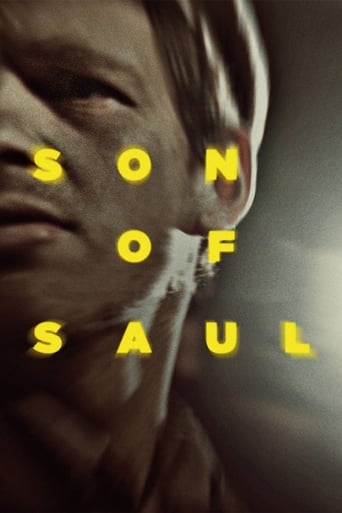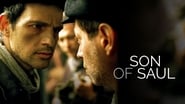jc-osms
I found this film almost as difficult to review as I did to watch. I guess many of us might fail to imagine the horrors of trying to survive Auschwitz on a minute by minute never mind hourly or daily basis but this film puts you almost literally on the shoulders of one man in the camp as the camera only rarely changes perspective from his subjective viewpoint to a more objective position so that you see what he sees and experience what he experiences. Immediately you sense the dehumanization of the individual as with him and his specially chosen fit and able fellow POW's he performs the task of removing, burning and disposing of the remains of the hundreds of daily gas victims there. When he sees a young boy somehow survive the gassing only to be even more cruelly murdered by suffocation by the German doctor on the scene, he impulsively decides to take the boy's dead body and have it consecrated by a rabbi.Along the way he gets involved in a mass escape attempt by his fellow inmates but even then carries the boy's corpse with him as he moves. As I said, the movie was excruciating to watch at tine. Think of all the famous (or infamous) cultural or artistic depictions of hell by the likes of Dante, Hyronemus Bosch Picasso, Goya and others.
Roger Burke
The Holocaust perpetrated by Nazi Germany in World War II is a touchy topic for any movie. Numerous documentaries have graphically shown the camps, the aftermath and the tools; writers and visual artists have expounded viscerally and poignantly for over half a century, and for lasting effect; and, of course, Hollywood and others have given us many biographical or fictional narratives to function as vehicles for holocaust commentary.None of the above, in my opinion, comes anywhere near the power of this movie, by first time writer/director, Nemes Laszo. Initially, the movie title intrigued me: Son of Saul. Which biblical Saul? I wondered. The first few minutes resolved that inquiry when it became evident that Saul Ausländer (Geza Röhrig) is one of the Hungarian-Jewish inmates of the camp assigned - as a member of the Sonderkommando i.e. Special Command - to persecute Jewish prisoners by assisting with herding them into gas chambers to their premature, unavoidable death. The irony of Saul's surname here - in English, Foreigner - serves to align this modern Saul with, naturally, Saul of Tarsus, Jewish and Roman citizen, and hence foreigner, who also persecuted the Jews - that is, until he experienced his life-changing epiphany on the road to Damascus.Röhrig the actor is phlegmatic to the point of being automaton, allowing virtually zero emotion on his face while he, as Saul, ritually and repetitively completes his horrific, daily routine of dispensing death to his fellow Jews. The hand-held camera is almost always on his face or the back of his head as we follow him everywhere in the camp, giving us a voyeuristic sense of heightened observation or even quasi-participation - a disturbingly unsettling feeling. Always in the background, and at the edges, the chaotic sights, unbearable sounds and unforgivable sins of the perpetrators while victims are summarily shot, shoved into gas chambers, thrown into fire, bludgeoned and beaten. These are Saul's days, staying alive for as long as he can, while consigning his humanity to the darkest depths of his persona....Until, unexpectedly, he discovers a young boy still alive - just - in the pile of bodies within a gas chamber: an apparent miracle. It's not clear if Saul knows him, or is even related to the boy. But, from that moment, Saul sets out to get the boy away to safety; and in apparent total disregard for his own life or, for that matter, the lives of his Sonderkommando accomplices in criminal anarchy. Thereafter, we continue to follow Saul as he continues his efforts to achieve his goal before he, also, is consigned to the same fate as all other victims.The denouement, when it comes, is realistic, inevitable and expected, I think - despite the dramatic twist the director inserts shortly before. The setting, acting, direction and camera work are simply outstanding. Never before, in all my time watching movies (sixty-five years and counting), have I been as close to a sense of reality as in this effort. There is harrowing, but also uplifting imagery in this story I will never forget.Highly recommended for mature adults and those interested in holocaust history. Nine out of ten.
Mikael Kuoppala
"Saul fia" is a unique, extremely powerful and potentially traumatizing cinematic masterpiece. A debut of Hungarian director László Nemes and co-writer Clara Royer, the film is a horribly realistic vision of Auschwitz-Birkenau in 1944.The unfathomable horrors of the concentration camp are shown from a singular perspective: the Hungarian protagonist Saul is a member of the Sonderkommando, a group of typically Jewish prisoners who were afforded extra rations and liberties for assisting in the mass extermination of their fellows. They were executed after their service which averaged around three months.The film opens as a new shipment of prisoners arrives and is guided by Saul and his peers to the gas chambers. As members of the Sondercommando, their job is to get the prisoners into the chambers with no panic arising, collecting their goods for processing and cleaning up the chambers from signs of genocide by the next batch. They are in a hurry. The Allies are closing in, the amount of destruction is scaled up, just in case. The opening is sickening to watch and especially to listen to.As Saul cleans the floors of the gas chamber he discovers one young boy has survived the gassing. He is taken to an autopsy after getting suffocated by the doctors. Saul realizes that the boy must be his son, and decides to do anything in order to give him a proper Jewish burial instead of the ovens. We follow Saul on a desperate quest to retrieve the boy's body and escape just long enough for a burial. He also roams the camp for a rabbi to perform Kaddish for burial.Saul is played by New York -based poet Géza Röhrig. He hasn't acted in anything else for almost three decades and is completely brilliant in what must have been an incredibly painful role. He plays a hollow man, but his hollowness is a force of nature in and of itself. His dead eyes still haunt me.The entire film is shot with virtually one take. Cinematographer Matyas Erdely's camera follows Saul intensely as he walks through the unfathomable inferno of Auschwitz for two days. Shallow focus shows Saul clearly while his surroundings remain blurry. The aspect ratio creates a claustrophobic box around him. We see all the horror but can't make it out in detail. We hear everything.I'm not entirely sure about the suggestive approach; it's certainly better than showing everything in focus but in a reduced manner. A clear, realistic depiction of all that we know went on might simply be too much for any audience to bear. Also, one of the most chilling points achieved by the shallow focus is in conveying the complete sense of detachment Saul feels about the things he sees and must participate in. He exists beyond morality, even beyond survival until he reconstitutes through his son. But for his quest, he's already dead. This also shows us viewers how easily we all get detached. People become bodies become waste out of focus. Just like when psychological dehumanization takes effect.At times the movie feels even tedious while it conveys absolutely incomprehensible cruelty in action. That tedium is intentional. Two hours is enough for one to turn apathetic in the face of genocide. A lesson frighteningly current. And not only in the film's homeland where antisemitism and general xenophobia seem to have emerged as the new normal but also all around Europe as well as the rest of the world. We are weak, fearful and passive, and because of that we can turn into vessels for acts of absolute evil."Saul fia" is one of those movies that I find powerful- even masterful- in the extreme but so traumatizing on so many levels that I can't directly recommend it to anyone. It exposes humanity at its weakest, darkest and most dangerously passive, just as it exposes every viewer.
rodrig58
It made me think of "Schindler's List"(1993) but this "Son of Saul"(2015) is different. It's as good as Spielberg's film, maybe even better. Love for your own child, even dead, makes you do unusual things, to defy death that awaits for you anyway, inside or off the concentration camp. A film excellently played, filmed, directed.






